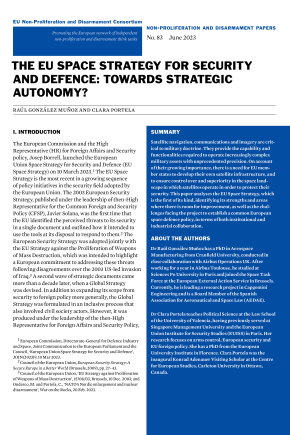The EU Space Strategy for Security and Defence: Towards Strategic Autonomy?

Satellite navigation, communications and imagery are critical to military doctrine. They provide the capability and functionalities required to operate increasingly complex military assets with unprecedented precision. On account of their growing importance, there is a need for EU member states to develop their own satellite infrastructure, and to ensure control over and superiority in the space landscape in which satellites operate in order to protect their security. This paper analyses the EU Space Strategy, which is the first of its kind, identifying its strengths and areas where there is room for improvement, as well as the challenges facing the project to establish a common European space defence policy, in terms of both institutional and industrial collaboration.
I. Introduction
II. The Importance of a Space Defence Policy
III. Europe In Space: EU and Member State Space Assets
IV. Objectives of the EU Space Strategy
V. Recommendations
VI. Conclusions
